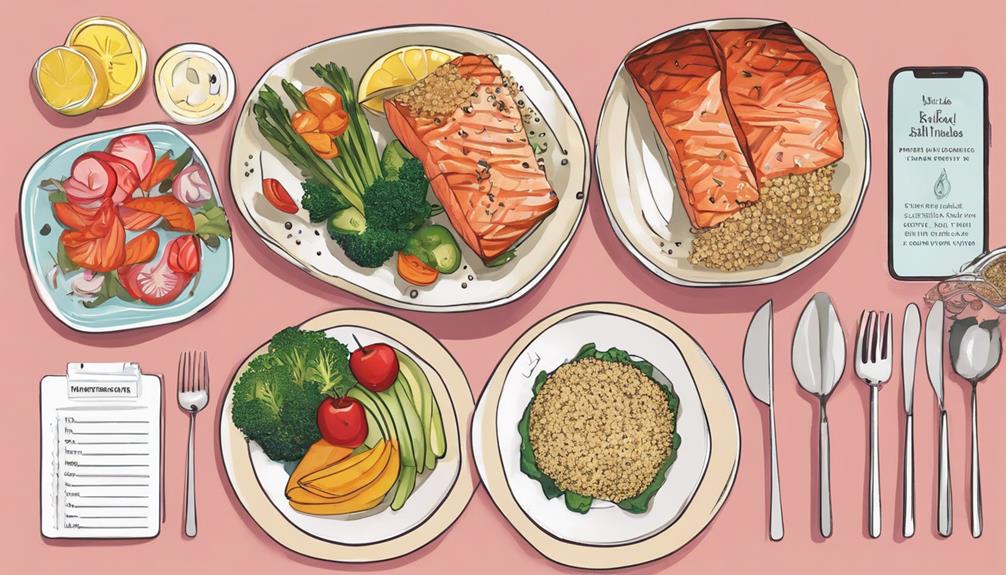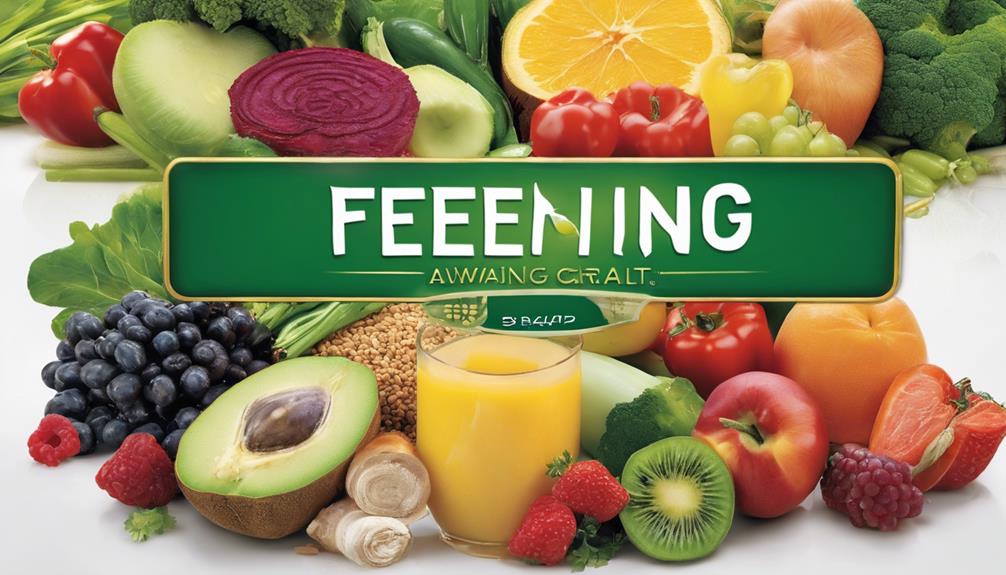As we navigate the domain of nourishment for breastfeeding mothers, it becomes apparent that a well-thought-out dietary regimen is paramount. Ensuring a balanced intake of essential nutrients can have a profound impact on both maternal well-being and infant development.
But what specific foods should be included in this diet plan to optimize health benefits for both parties involved? Let's explore the intricacies of crafting a nutritionally sound menu that caters to the unique needs of breastfeeding moms and their little ones.
Key Takeaways
- Choose nutrient-rich foods to support breastfeeding and infant development.
- Plan balanced meals with lean proteins, whole grains, healthy fats, and fruits/vegetables.
- Prioritize meal preparation for convenience and optimal nutrition.
- Seek guidance from a nutritionist for personalized breastfeeding diet recommendations.

Legendairy Milk Liquid Gold Lactation Support | Lactation Supplement with Organic Goats Rue, Milk Thistle, Shatavari, Fennel, Alfalfa & Anise | Breastfeeding Supplements, 60 Count
𝐒𝐓𝐄𝐏 𝐔𝐏 𝐘𝐎𝐔𝐑 𝐋𝐀𝐂𝐓𝐀𝐓𝐈𝐎𝐍 𝐆𝐀𝐌𝐄 – Liquid Gold is a powerful blend of 6 certified organic ingredients well-known…
As an affiliate, we earn on qualifying purchases.
As an affiliate, we earn on qualifying purchases.
Breastfeeding Basics
Understanding the essential aspects of breastfeeding is important for new mothers to provide the best care for their infants. Breastfeeding offers a myriad of benefits, such as boosting the baby's immune system, fostering a strong bond between mother and child, and providing easily digested nutrition tailored to the infant's needs. Colostrum, the initial milk produced after birth, is rich in antibodies and essential nutrients that support the baby's immune system during the critical early days.
Breast milk composition dynamically changes to meet the evolving requirements of the growing infant. It adapts to provide the necessary proteins, fats, carbohydrates, and micronutrients essential for the baby's development. This personalized nutrition can't be replicated by any formula.
The act of breastfeeding not only nourishes the baby but also enhances the emotional connection between mother and child, promoting feelings of security and comfort for both.

Nature Made Prenatal Vitamins for Women with Folic Acid + DHA, Prenatal Vitamin and Mineral Supplement for Daily Nutritional Support, 110 Softgels, 110 Day Supply
Now with orange scent: Adults take one pre natal multivitamin for women daily with water and a meal…
As an affiliate, we earn on qualifying purchases.
As an affiliate, we earn on qualifying purchases.
What to Eat

As we consider the nutritional needs for breastfeeding moms, focusing on a well-rounded diet is key to supporting both maternal health and best infant development.
A healthy breastfeeding diet should include lean protein sources like chicken, fish, beans, and tofu for muscle repair and growth. Incorporating whole grains such as brown rice, quinoa, and whole wheat bread provides sustained energy needed for the demands of breastfeeding.
Healthy fats from avocados, nuts, seeds, and olive oil are essential for infant brain development. Including a variety of fruits and vegetables in your breastfeeding meal plan guarantees that you get essential vitamins, minerals, and antioxidants necessary for both you and your baby's health.
Opt for calcium-rich foods like dairy or dairy alternatives fortified with vitamin D to support bone health and development. By focusing on these essential food groups, you can create a well-balanced diet that promotes best health during breastfeeding.

THE LACTATION KITCHEN COOKBOOK (FULL COLOUR EDITION): The Breastfeeding Mom's Nutrition Guide complete with Milk-Enhancing Meal Plans, Protein Smoothies, Quick Snacks and Postpartum Healing
As an affiliate, we earn on qualifying purchases.
As an affiliate, we earn on qualifying purchases.
Meal Plan Examples
When creating a meal plan for breastfeeding moms, we prioritize a diverse range of nutrient-dense foods to meet the increased caloric and nutrient requirements during this important period. A well-rounded meal plan should include lean protein sources like chicken, fish, beans, and tofu for muscle repair and growth. Incorporating whole grains such as quinoa, brown rice, and whole wheat bread guarantees sustained energy levels. Healthy fats like avocado, nuts, and seeds are essential for brain development and hormone production. Additionally, including plenty of fruits and vegetables provides crucial vitamins, minerals, and antioxidants necessary for both the mother and the breastfeeding baby.
| Meal Plan Examples |
|---|
| Breakfast: Scrambled eggs with spinach and whole grain toast |
| Snack: Greek yogurt with mixed berries and a sprinkle of chia seeds |
| Lunch: Grilled chicken salad with quinoa and avocado |
| Snack: Sliced apples with almond butter |
| Dinner: Baked salmon with sweet potato and steamed broccoli |

bird&be Calcium + Magnesium + Vitamin D3 Supplement | Bone Strength & Muscle Relaxation | Pregnancy & Breastfeeding Safe | Leg Cramp Relief + Sleep Support | Bioavailable Mineral Boost | Vegan
THE "EVENING RITUAL" MINERAL BLEND: The perfect nightcap for pregnancy and beyond. Magnesium helps relax tense muscles and…
As an affiliate, we earn on qualifying purchases.
As an affiliate, we earn on qualifying purchases.
Tips for Preparation

To streamline meal preparation for breastfeeding moms, consider employing time-saving techniques such as batch cooking and meal prepping in advance. This not only guarantees that you have nourishing options readily available when hunger strikes but also saves time. Utilize easy recipes that require minimal cooking to simplify meal preparation even further, allowing you to focus more on caring for your little one. When planning your meals, make sure to include nutrient-dense ingredients to support your breastfeeding needs and overall health.
Here are some tips for efficient meal preparation:
- Batch Cooking: Dedicate a day to preparing meals in bulk that can be portioned out and frozen for later use.
- Well-Stocked Pantry: Keep your pantry stocked with essential ingredients like whole grains, legumes, canned goods, and spices to easily put together balanced meals.
- Freezing Meals: Consider freezing individual portions of meals for quick and convenient access to healthy food on busy days.
Nutritionist Consultation
Streamlining meal preparation for breastfeeding moms can be further enhanced by seeking personalized guidance through nutritionist consultations. Registered dietitians specialize in providing tailored advice on the nutrient requirements of lactating individuals. These healthcare professionals can address specific dietary concerns unique to breastfeeding, ensuring both maternal and infant health are prioritized. By scheduling a consultation with a dietitian, breastfeeding moms can work together to create customized meal plans that optimize nutrition during this critical period.
| Benefits of Nutritionist Consultation | Description |
|---|---|
| Personalized Guidance | Receive tailored advice on breastfeeding nutrition. |
| Address Dietary Concerns | Healthcare professionals help with specific dietary needs. |
| Customized Meal Plans | Create the best meal plans for maternal and infant health. |
| Optimize Nutrition | Ensure dietary choices align with breastfeeding requirements. |
Frequently Asked Questions
What Is the Eating Schedule for Breastfeeding Moms?
We aim to eat every 2-3 hours to maintain energy levels and support milk production. Balanced meals and snacks stabilize blood sugar levels, prevent energy crashes, and promote healthy weight management postpartum. Consistent eating schedules are key.
What Is a Balanced Diet for Breastfeeding Mothers?
We focus on a balanced diet for breastfeeding moms, emphasizing nutrient-dense foods like lean proteins, whole grains, healthy fats, and a variety of fruits and vegetables. These choices support energy needs, muscle repair, brain development, and overall health for both mother and baby.
What Are the Dietary Guidelines for Breastfeeding Mothers?
We prioritize a balanced diet for breastfeeding moms, focusing on extra calories, protein intake, hydration, and essential nutrients like iodine and choline. Consulting a dietitian is key for personalized guidance on maternal and infant health.
What Are the Guidelines for a Healthy Diet When Breastfeeding?
When breastfeeding, we focus on nutrient-dense foods like whole grains, lean proteins, and fruits/vegetables. Hydration is key; aim for 16 cups of water daily. Essential nutrients like iodine and choline are vital. Consult a dietitian for personalized guidance.
Conclusion
Optimal, following a balanced diet while breastfeeding is essential for both mom and baby's health. Remember, a well-nourished mama equals a happy and healthy baby.
So, let's continue to prioritize nutrient-rich foods, stay hydrated, and seek professional guidance for optimal nutrition during this special time.
Your body is doing amazing things, and it deserves to be nourished and cared for with love and intention. Keep up the good work, mama!









